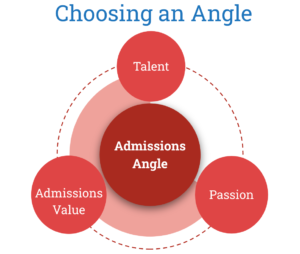
What's an Admissions Angle?
It’s no secret that the college admissions process is competitive. When a high school student is deciding how to best spend their time on courses, extracurricular activities, tests, and community involvement, it’s important to spend it in a cohesive and efficient manner, one that centers around an Admissions Angle. But what’s an Admissions Angle?

By ALEX LOVELESS
Admission to top colleges is more competitive than ever. With admissions offices all over the country receiving a record-breaking volume of applications, it can feel overwhelming to stand out among the sea of applicants.
Whether you are a high schooler or a parent of one, you’ve probably felt the pressure. Long gone are the days of securing admission with a strong GPA and SAT score alone. Colleges are looking for prospective students who have a clear story with defined goals and a passion for their future. In other words, colleges are looking for an Admissions Angle.
What's an Admissions Angle?
Put simply, an Admissions Angle is a strategy for an outstanding college application. A good Admissions Angle will combine a student’s talent and passion with admissions value. This allows students to tell a compelling and well-supported story about their ambitions. Let’s look at each of these three factors in isolation:

Talent
When admissions officers consider talent, they are looking for proof that a student is good at something. This proof comes in the form of advanced coursework in the given subject, strong grades, and perhaps an activity or two that supports this interest.
The easiest illustration of talent is for something like art school. An art school admissions officer will think, “Okay, you want to study art. Show me that you’re good at art, and I’ll believe you.” But the same principle applies to every subject. An engineering student should earn As in advanced math and science courses while participating in related clubs and contests. A business student should support their coursework with leadership. A sociology or psychology student should consider working with sensitive or underserved populations.
Without talent, a college application is simply unsupported, which is not impressive to admissions officers.
Passion
While passion is difficult to measure, it is easy to feel in materials like a student’s essays and recommendations. Experiences to write about enthusiastically in essays and recommenders who are acquainted with a student’s ambitions are gained through extracurricular activities and involvement.
To lack passion in one’s application is to deliver an uninspired reason for why an admissions officer should choose you. A strong Admissions Angle will not manufacture a student’s interest but rather lean into the subjects that stoke their natural intellectual curiosity. Passion should be authentic and palpable in a college application.
Admissions Value
It is possible to be talented and passionate at something that has no admissions value (playing video games comes to mind). An easy way to assess admissions value is to ask, “Is there a major for that?” Then, “Do my activities support that major?”
The second question here is an important one: Do a student’s talents and passions amount to the right admissions value? A student may be talented and passionate at music, having participated in band or orchestra, community music projects, etc. And music does have admissions value… if you’re planning to pursue a music degree. But if that student is wishing to pursue a major in something like business, economics, or biology, then perhaps that time learning music would have been better spent cultivating an interest in the major they wish to pursue.
Admissions value is critical for an admissions officer. An application that lacks in admissions value will be seen as unappealing and have trouble ascending from the ‘maybe’ pile.
College Admissions Services
Schedule a Free Consultation
Meet with a mentor one-on-one via video chat to talk about your son/daughter’s admissions plan. Afterwards, receive a no-obligation Customized College Roadmap (CCR) with advice on courses, extracurricular activities, standardized tests, and Admissions Angle strategy.
Supporting an Admissions Angle
I’ve already mentioned some of the basics that go into an Admissions Angle strategy – grades, activities, and aligning a student’s experiences with the correct choice of major. But let’s delve deeply into the five best ways to support an admissions strategy: academic index, community impact, intellectual vitality, skills and talent, and character.

Academic Index
A student’s academic index is the cross-section between grades and standardized test scores (ACT or SAT). Before an admissions officer looks at anything else, they are deciding whether a student’s academic index meets their minimum threshold for admission.
In other words, most colleges have an expected minimum GPA and test score. If you reach that minimum, your application will be taken seriously. But if you don’t, then it’s an uphill climb, as it is difficult to make up for weak grades with activities and recommendations, even if they’re great.
Another important piece of the academic index is what is called the ‘rigor of coursework’ and asks the question: Did you challenge yourself as much as you could have? Students should be enrolling in as much advanced coursework as they can handle. A perfect GPA is not as valuable if it looks like the student didn’t push his or her abilities.
Community Impact
Colleges are looking for students who will participate actively in their school community, even after graduation. A good way to demonstrate that you’re this kind of student is to show how you have impacted your high school or local community – and the bigger the impact, the better.
What have you done to improve your community and leave your mark? Are your efforts scalable or lasting? What impact have you had outside of volunteer hours? For most students, community impact goes well beyond passively collecting hours through physical labor (e.g. collecting garbage or running a 5k) or cliche activities (e.g. tutoring). Excellent community impact involves leadership, collaborating with local businesses or governments, logistical planning, and a connection to the Admissions Angle.
If a student wants to get into something like environmental science or sustainability, then they should get involved with something like local climate activism. If a student wants to earn a degree in psychology, then they should generate a school-wide activity to address a mental health concern. These are only examples, but once an Admissions Angle is established, it should be supported through a genuine concern for community.
Intellectual Vitality
How have you demonstrated curiosity about your academic interests/future career outside of the classroom? What drives your passion for learning? A student – or anyone, for that matter – will work harder when they legitimately care about their subject or project. Admissions officers are looking for students who will work hard in college, so this kind of commitment is expected on an application.
Natural curiosity is impossible to fake or contrive. A solid Admissions Angle must have the passion to match the talent, which is why the strongest Angles are years in the making. As mentors, we will always lean into a student’s interests rather than prescribing a path forward. However, if a student is older and has not had the time to fully realize a strategy, it may become necessary to reverse engineer an Admissions Angle.
Skills and Talent
Although we have touched on the importance of talent in an application, this support goes beyond coursework and cuts to the core of a student’s personal characteristics. Admissions officers are not only asking, “Do you have the skills to perform in an advanced college classroom,” but also “Do you have the character to excel in our community?”
What are you good at, yes. But also, how well do you work with others? How well do you lead? What do you have to show for your efforts? Consider, also, supporting qualities that are nevertheless useful for a given profession. If you want to go into public health, how can you demonstrate compassion? If you want to go into history, how can you demonstrate your skill as a researcher?
Character
Of all the support that you can give an Admissions Angle, character is the most difficult to quantify. Character considers questions like, what kind of person are you? What values do you hold? How do you respond to adversity? Answers to these questions are often addressed in the Common Application personal statement and supplemental essays. However, you can’t simply say “I’m a team player and I value teamwork” without being able to point to an example.
A good Admissions Angle will be supported by activities and experiences that not only build but also demonstrate character. When it’s time to sit down to write your essays, what are you going to say? What will your evidence look like for the kind of student you are?
Authentic Admissions
We know from years of experience that the Admissions Angle approach works, but there are many independent educational consultants who will tell you the importance of the above items. However, The Admissions Angle is different in our approach.
At The Admissions Angle, we do not believe in pushing a student down a set path. While other consultants prescribe pathways with repeatable approaches, The Admissions Angle supports unique pathways for unique students. No two students are the same, so no two Angles should be the same either. We work within a student’s interests to discover the best and most personal Admissions Angle and cultivate novel ways to support that Angle, together.
Students should represent their best and truest selves on their applications. An Admissions Angle is not only a strategy but also a vision for helping tomorrow’s leaders find and hone their academic passions early. This type of planning and guidance instills confidence, allowing the student to aim higher, work harder, and see a purpose for their efforts.









